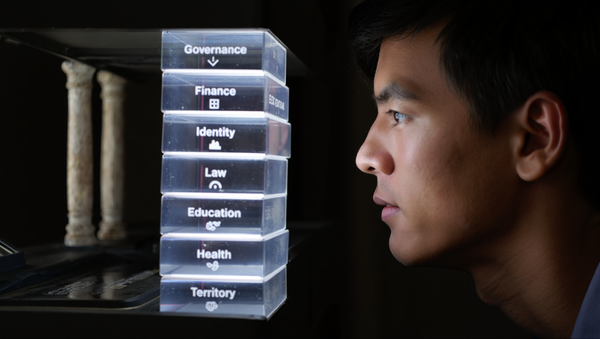What is a Forked Society?

The Rise of Stackable Civilization
Why You Will No Longer Inherit Society — You Will Assemble It
If civilization were an app, we’d be overdue for an update.
For most of history, society has been bundled like old software: one provider, one operating system, one way of doing things.
You didn’t choose your government, your school system, or your currency.
You inherited them — bugs and all.
But something has changed.
We are now witnessing the emergence of a new architecture of civilization — one where every layer of life is becoming modular, forkable, and upgradeable.
A world where governance, finance, law, education, health, and identity are no longer bundled into a single nation-state, but built as open-source primitives.
This is the essence of a Forked Society.
🛠️ Society Is Already Forking Itself
This isn’t theory. It’s reality.
From money to law to territory itself, the most powerful systems in society are already being replicated — and in some cases, replaced.
🏛️ Governance → Dubai’s Dual-System Legal Zones
Dubai pioneered the modular state: Sharia governs cultural life, while English common law governs commerce. Inside the DIFC, governance runs like a software stack — layered, opt-in, and built for speed.
💸 Finance → Bitcoin and Dollar Stablecoins
Bitcoin is state-proof money, adopted by citizens, institutions, and even nation-states. In parallel, USDC and USDT have become everyday currencies in inflation-wracked countries. For millions, stablecoins are already more trusted than banks.
🏙️ Territory → Charter Cities & Special Economic Zones
From Próspera in Honduras to NEOM in Saudi Arabia, entirely new cities are being developed with their own rules, governance, and infrastructure — forks of the nation-state itself, backed by billions.
⚖️ Law → Smart Contracts and On-Chain Arbitration
Ethereum processes over $1 trillion a year without courts. Platforms like Kleros now handle community-based dispute resolution with speed and transparency. Law is becoming programmable.
🌍 Citizenship → E-Residency and Flag Theory
Estonia’s e-Residency lets 100,000+ digital citizens operate businesses globally. Combined with second passports and nomad visas, people now choose their jurisdiction like a software license — not a birthright.
🧱 The Sovereignty Stack
A New Operating System for Civilization
These aren’t isolated upgrades.
They’re pieces of a new societal stack — a modular alternative to the legacy state.
In the old world, everything came bundled.
In the new world, everything is being unbundled and rebuilt.
Each layer is forkable. Each can be improved.
Together, they form a new civilizational OS:
• Governance → issues voting, liquid democracy, real-time proposals
• Finance → crypto wallets, stablecoins, DeFi
• Identity → decentralized IDs, soulbound tokens, onchain reputation
• Law → smart contracts, peer arbitration, opt-in legal frameworks
• Education → self-paced, peer-reviewed credentials, micro-schools
• Health → sovereign health data, bio-networks, AI diagnostics
• Media → decentralized publishing, memetic tribes, trust networks
• Infrastructure → networks, microgrids, startup cities, cloud societies
You no longer inherit a society.
You assemble it.
🌐 Digital-First, Physical-Second
In the 20th century, land was sovereignty.
Your birth country determined your identity, your access, your options.
Then came COVID.
Borders closed. Offices emptied. Schools vanished.
But the internet stayed open — and society kept running.
Suddenly, we weren’t living in countries.
We were living in apps.
• The classroom became a Zoom link.
• The company became a Slack channel.
• The marketplace became a Stripe dashboard.
• Governance happened on Twitter.
What began as contingency became revelation:
Civilization no longer starts with geography. It starts with code.
A DAO becomes a town hall.
A Telegram group becomes a school.
A shared wallet becomes a sovereign treasury.
Instead of being born into a system, you opt into one.
Instead of crossing borders, you join servers.
Geography becomes a choice.
Citizenship becomes a setting.
COVID didn’t create this shift — it revealed it.
🧬 From Protest to Prototype
Forked societies don’t wait for governments to reform.
They build better ones.
• When parents replace traditional schoo — they fork education.
• When communities crowdfund infrastructure — they fork finance.
• When people use smart contracts instead of courts — they fork law.
• When cities like Culdesac redesign urban living — they fork urbanism.
This isn’t revolution.
It’s iteration.
🔁 Civilization Is Becoming Stackable
The future won’t be governed by one state.
It will be governed by stackable services:
Money → Crypto
Law → Smartcontracts
Governance → Decentralised
Citizenship → Opt-in, portable, digital first
Sovereignty-as-a-Service
Like apps on your phone, these systems will be composable.
Unlike empires, they’ll be opt-in.
And the sovereign individual becomes the new civic architect — stacking systems, building worlds, and curating their own reality.
🌍 One Day, Everything Will Be Forked
A fully forked society doesn’t mean the end of governments.
It means the end of monopoly.
Just as you can now choose your bank, your browser, your news feed —
One day you’ll choose your jurisdiction, your identity layer, your education stack, your healthcare protocol.
Sovereignty will be stackable.
Society will be composable.
Citizenship will be cloud-based.
And like any great system — it will finally be something you can upgrade.




